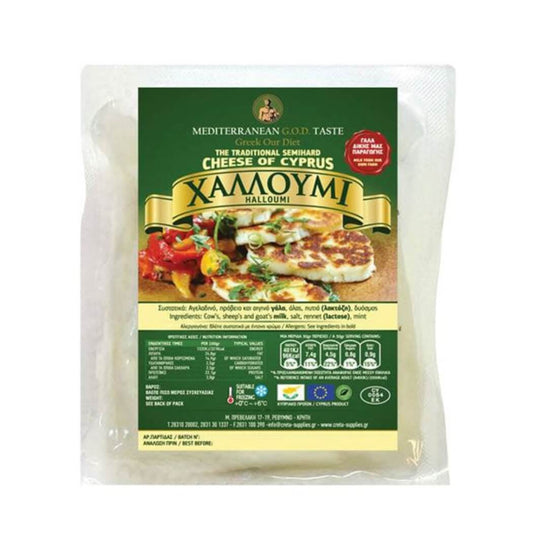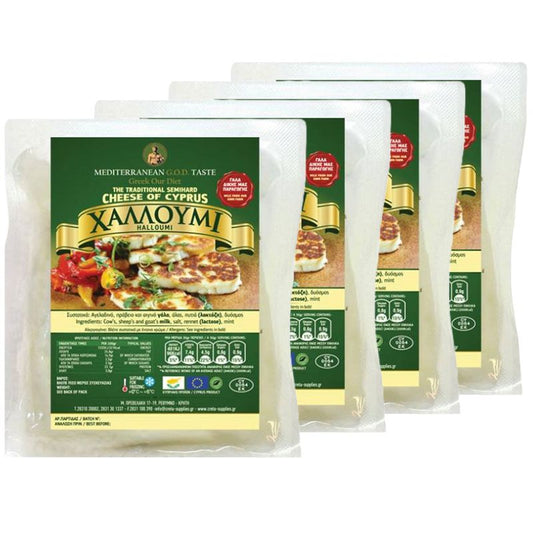HALLOUMI, A TRADITIONAL MEDITERRANEAN CHEESE
The halloumi can fully be considered one of the most widespread cheeses in the whole Mediterranean basin and beyond. Halloumi cheese traditional area of origin is identified with the island of Cyprus: according to the tradition Arab merchants brought the recipe on the island.
This 100% Mediterranean origin also had an official recognition. The European Union has in fact recognized halloumi as a traditional PGI cypriot cheese, thus removing any doubts as to its origin and traditional production area.
HALLOUMI: CHEESE USED IN THE KITCHEN AND IN THE MEDITERRANEAN DIET
The halloumi is one of the most used cheeses in the majority of the Mediterranean countries, this is certainly due to the fact that it is easily combined with other ingredients and it offers multiple cooking possibilities.
It is in fact a white cheese, produced using a mixture of goat's milk and sheep's milk. It is usually produced in its classic parallelepiped or tile shape, which allows a simple and precise cut into slices. It is a fairly fat cheese with an average soft consistency
The taste is rather salty and the wrapped halloumi is accompanied by herbs and natural aromas. The resuly is a unique aroma and flavour. But as said, cooked halloumi is present in innumerable recipes and uses in the kitchen.
The cheese is excellent when prepared on the grill, thanks to its high melting point. First prepare slices of halloumi and then, thanks to its particular consistency, it is able to withstand the cooking temperature by taking on the classic crunchy striations of the grill and remaining soft and fragrant at the same time.
When cooked, simply lay the grilled halloumi tiles on a plate and garnish with vegetables and sauces according to your taste. It is a squeaky cheese and this is also an unmistakable feature of this product.
Some chefs particularly attentive to fusion and innovative cuisine, offer halloumi burgers, where cheese is the main component instead of the classic piece of meat. In addition, paired with red onion it is particularly delicious!
An equally exceptional variant of this cheese cooking is in frying pan. Starting from the usual rectangular slice, fried halloumi can become a tasty alternative to the classic Greek saganaki. Its preparation is extremely simple and thanks to its consistency it is able to maintain the original shape thus avoiding to melt excessively.
The Mediterranean diet has actually adopted this cheese as the ideal cheese to prepare the best halloumi salads. The salads that see the presence of halloumi are innumerable and all very good, their creativity in the kitchen is in fact able to give this delicious ingredient the right role in any Mediterranean salad.
A salad with it is as good as the ones with the feta cheese. Remember to always drill abundant Greek olive oil!
Some prefer just using fresh halloumi, cut it into cubes or stripes and add it to fresh vegetables to create a salad full of taste and well-being in a few minutes. Other classic pairings in salads are with cooked vegetables, better if grilled or in the oven, and with meat (better than lamb ... as they do in Cyprus!).
Surely, the most unusual but at the same time curious use is halloumi for breakfast. In fact, its slightly salty but overall fairly neutral flavor classifies it as an ideal match even for sweet ingredients.
For this reason it can be accompanied by honey or fresh seasonal fruit to create a succulent and complete dish with which to start the day.
In any case, what makes halloumi one of the favourite cheeses in the entire Mediterranean basin, is its ease of matching, the simplicity of cooking ... and of course its unmistakable taste and flavour!
Greek Flavours brings the best halloumi cheese from the island of Cyprus directly at your place.
Read LessHALLOUMI, A TRADITIONAL MEDITERRANEAN CHEESE
The halloumi can fully be considered one of the most widespread cheeses in the whole Mediterranean basin and beyond. Halloumi cheese traditional area of origin is identified with the island of Cyprus: according to the tradition Arab merchants brought the recipe on the island.
This 100% Mediterranean origin also had an official recognition. The European Union has in fact recogniz... Read More
















